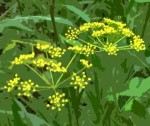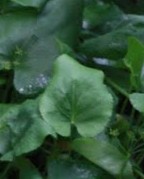 This short-lived perennial is a member of the carrot family, Apiaceae, that also includes parsley, celery, and poison hemlock. It is a native of moist to seasonable wet meadows and open woods from the Canadian border to Florida, west to Nevada. Its bright yellow flowers are borne in flat clusters on sparingly branched plants that brighten late spring gardens while its attractive heart-shaped basal leaves are attractive all season long and turn wine-colored in fall. Black swallowtail larvae are particularly fond of the foliage. Heart-leaf Alexander is very easy to grow, adapting to a wide range of soil and light conditions. The genus name, Zizia, honors the German botanist Johann Baptist Ziz (1779-1829). The specific epithet, aptera, comes from the Greek prefix a, negating the following word, and pter, meaning wing, so means wingless.
This short-lived perennial is a member of the carrot family, Apiaceae, that also includes parsley, celery, and poison hemlock. It is a native of moist to seasonable wet meadows and open woods from the Canadian border to Florida, west to Nevada. Its bright yellow flowers are borne in flat clusters on sparingly branched plants that brighten late spring gardens while its attractive heart-shaped basal leaves are attractive all season long and turn wine-colored in fall. Black swallowtail larvae are particularly fond of the foliage. Heart-leaf Alexander is very easy to grow, adapting to a wide range of soil and light conditions. The genus name, Zizia, honors the German botanist Johann Baptist Ziz (1779-1829). The specific epithet, aptera, comes from the Greek prefix a, negating the following word, and pter, meaning wing, so means wingless.
Type: Herbaceous perennial
Bloom: Tiny lemon-yellow flowers are borne in umbels 2-3” across in late spring.
 Foliage: Basal leaves are cordate or broadly ovate; upper leaves are smaller and often compound with each leaflet being lobed.
Foliage: Basal leaves are cordate or broadly ovate; upper leaves are smaller and often compound with each leaflet being lobed.
Size: 1-3’ H x 1-2’ W
Light: Full sun to light shade
Soil: Average-humus-rich, moist-wet, acidic to neutral but tolerates less; is drought tolerant once established
Hardiness: Zones 3-8
Pests and Diseases: None of significance
Propagation: Division in spring or fall; stratified seeds in fall but germination is often low; needs cool soil for best results.
Companion plants: Columbine (Aquilegia canadensis), Canadian anemone (Anemone Canadensis), spiderwort (Tradescantia virginiana), Joe Pye Weed (Eupatorium purpureum)

Do you know if this plant only grows in Canada and America or does it grow in the UK? Can’t seem to find it.